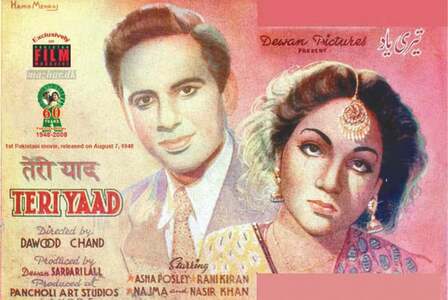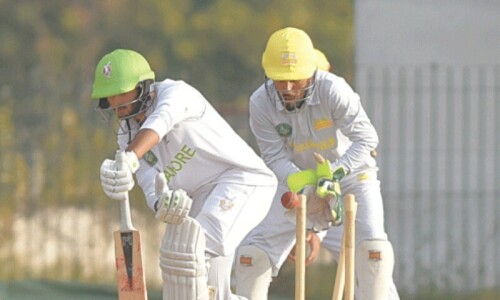The Liar’s Truth
By Haroon Khalid Akhtar
Liberty, Karachi
ISBN: 978-9698729745
184pp.
The opening sentences of Haroon Khalid Akhtar’s latest novel, The Liar’s Truth, declare: “This country’s history is forced to repeat itself, by hook or by crook. You can therefore see that another prime minister is on his way to the gallows.”
Clearly, we’re about to journey into a deep, political abyss.
The country — unnamed for the most part — is in a mess and, blaming politicians and dictators for the chaos, the extraordinary powers-that-be have decided a shuffle-up is in order. The powerful kingmakers are “tired of giving the same man repeated chances” and annoyed because he regularly “commits everything and then conveniently forgets.” Now they would like to gamble on someone new.
As their sort-of representative, the Greek god Zeus sets out to pick the ‘someone new’, who will get the job of the country’s prime minister.
A new novel by Haroon Khalid Akhtar combines political satire, humour and wit and will no doubt remind the reader about parallels with Pakistan
This turns out to be Arsalan, a banker who likes telling tall tales. He has no political experience but, as Zeus explains, is chosen “not for possessing any exceptional qualities, but for your compliant and steady personality that shies away from conflicts as well as from wealth … who can be trusted to serve humanity without asking too many questions.”
Arsalan’s cabinet — each person selected on Zeus’s instructions — comprises an ambulance driver, a pimp, a fashion model, a matchmaker, a singer and a professor. None have any idea of how to run a country.
The clueless prime minister and his equally nonplussed team get to work. Their approach is focused on public good and so, alongside the usual ministries of finance and foreign affairs, they create ministries of national identity and hope, mankind and compassion, love and harmony, culture and incitements for promoting art and literature.
Upon arriving at the prime minister’s official residence, Arsalan — as any ordinary person would be — is flabbergasted by the opulence, waste of resources and mass of government expenditure. The amount of irrelevant paperwork and bureaucratic red tape he encounters is appalling. His frustration mounts when, everytime he asks for something to be done, he is told that a summary will be prepared, which must be approved by so-and-so people before anything is actually done.
Author Akhtar’s views come across through his characters, who talk about the poor law and order, failing economy, falling reserves and the strangulating conditions imposed by the International Monetary Fund.
The role of the ‘establishment’ — with which we’re all becoming increasingly familiar — and its immeasurable power to topple entire governments, is discussed very overtly and one minister tells Arsalan: “The establishment’s interference was a ruler’s worst enemy after greed, incompetency and debauchery.”
The country’s previous rulers are aptly described. None of them have ever “truly set foot on the soil of this motherland, walked its streets, inhaled its fumes, mourned its dead, swam in its canals, ate its unsafe food, caught its disease and loved its smell. They live in the clouds from where no problem is visible.”
Rising from the clouds, they intend to stay in the clouds. But Arsalan is different. He will actually do something for his country when given the chance — although he did accept the challenge reluctantly — and is put to the test when a battle with the judicial system rears its head.
Dealing with law-breaking lawmakers is no easy task, but our hero struggles on, because “I’d rather be a man who tried and failed, rather than someone who never tried.”

After becoming prime minister, Arsalan makes a speech, saying that like the previous rulers, he’s been told he can “award contracts, receive kickbacks and become filthy rich by stashing away cash in that bastion of the first world called Switzerland.”
He also points to public apathy and acceptance of all such practices: “... I am sure you would not object to such conduct since you have never objected to it in the past.”
But no matter how much freedom he’s been promised, at the end of the day Arsalan is expected to conform to the establishment’s whims. His motley crew of ministers devises novel solutions to problems, but they’re not implemented as the kingmakers don’t really care about the people’s welfare. They care only for their own gains and, when Arsalan defies, wanting to change the status quo, he is kicked out of office.
Incarcerated in prison on multiple charges — including that he is in cahoots with the enemy country next door and his wife is a spy just because she has relatives there — and facing a brutal media trial, Arsalan writes his memoirs — this book — in order to clear his name.
The Liar’s Truth admittedly starts off slow, with Arsalan giving a detailed introduction of himself as he roams the city streets during his lunch break, looking to buy a gift for his wife. But it becomes quite absorbing the further one reads.
Given Pakistan’s current political situation, one can’t help note the far too many similarities between the world in which Arsalan is caught and the political turmoil Pakistan has been facing for more than half a century. It wouldn’t be wrong to say that the book is a captivating insight into the political wrangling and lack of true leadership in the country.
Meanwhile, the personal tragedies Arsalan’s ministers are coping with show the real side of ordinary life. Trials and tribulations have left indelible marks on them, but they’ve learned to cover the scars well.
In between narrating his adventures, Arsalan refers frequently to his personal life, which alternates between romantic — because of Maya, his wife and the love of his life, whose advice he often seeks — and miserable, because of his boss, Mr Bandooqwala, to whom Zeus bears an alarming resemblance.
The end comes as a shock because at no point until then has the author hinted towards the misfortune that has befallen a certain character.
The book is a brilliant combination of satire, humour and wit by a master storyteller. One may not like some of the jokes, but mostly the humour leaves the reader amused and smiling, while the satire is a reflection of our political set-up.
A real eye opener if one is still living in a dream world.
The reviewer is a freelance journalist and tweets @naqviriz
Published in Dawn, Books & Authors, August 14th, 2022















































Dear visitor, the comments section is undergoing an overhaul and will return soon.